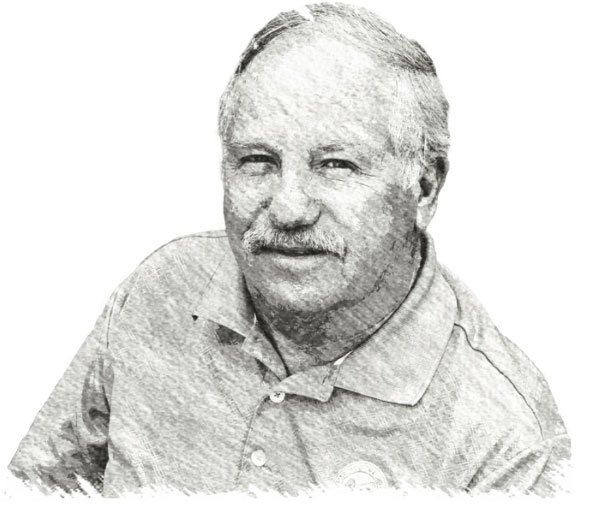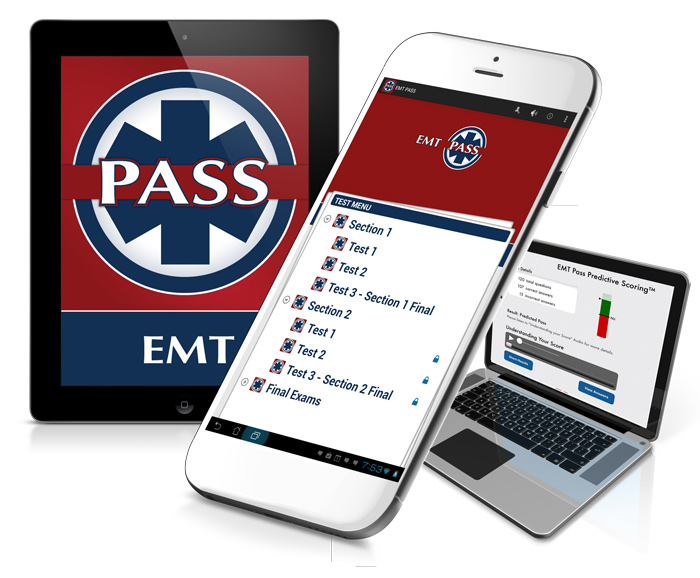EMT PASS Philosophy
Why William Brown wrote EMT PASS
During my 28 years of employment at the NREMT I attended over 100 item-writing meetings and answered thousands of phone calls.
Emotionally I never “got over” talking to an EMT candidate who failed the test. I heard the pleas for help. I felt their pain.
BUT there was nothing I could do for them. I knew the methods the NREMT used to build the test and determine the pass/fail score. The exam was and still is sound. There never was anything flawed about the test—and still isn’t.
What bothered me most about the many phone calls I took from candidates who failed the EMT exam were their comments.
Many admitted not reading the book. Many said they were in classes where a high percentage of their classmates also failed the test. Many said they missed a lot of classes. I thought some deserved to fail because they lacked the effort to pass. Yet there remained many who I thought I could help if I wasn’t an employee of the NREMT. The NREMT is a certification agency, not an educational institution. The NREMT is not, and never should be, an agency that develops products to help potential EMS providers pass the test. That would obviously be a conflict of interest for them. States approve education programs and many approve instructors. States are the agency responsible for EMS education, not an agency like the NREMT.
Other “test” preparation applications and texts
I looked at many EMT review applications and books of test questions, and believed they were inadequate in preparing the candidate to take the EMT exam.
 I read many claims that “______ has questions, just like the National Registry.” This was untrue. Most were recall questions in which the author claimed to know how to write similar NREMT questions; again, another untrue statement. Other test preparation products included questions that were too easy—resulting in giving the test candidate false confidence.
I read many claims that “______ has questions, just like the National Registry.” This was untrue. Most were recall questions in which the author claimed to know how to write similar NREMT questions; again, another untrue statement. Other test preparation products included questions that were too easy—resulting in giving the test candidate false confidence.
Points of knowledge
I also knew that within the EMT domain of knowledge there are only so many “knowledge points.” I believe there are approximately 500 or so of these points. I also felt that if an aspiring EMT knew those points he/she would pass the certification examination.
I believed that if I provided well-written test questions that were similar to those that might appear on the EMT exam, and would be able to talk about these questions to aspiring EMT candidates, they would be well prepared to take the EMT exam; they would be exposed to the knowledge points; they would learn how test questions should be constructed, and most importantly, how to digest them so they had a better chance of getting the question correct. I also believed that when I spoke to candidates about the question, I could tie it to the learning experience to encourage better patient care. I never believed this was “cheating.” None of the questions in EMT PASS came from the NREMT. I never retired from the NREMT with any “list” of the knowledge points. There is no such list. However, I was confident that I could develop an application that could “debrief” questions over knowledge points I had discovered in various textbooks. By listening to the “debriefings,” an aspiring candidate would then know how to digest test questions, and learn the important knowledge points. This is how a student becomes “test wise.”
What I discovered when writing practice test questions for EMT PASS is that there are many more knowledge points than I originally thought! Therefore, all of the questions in EMT PASS cover all of the points I found, and not one question covers the same knowledge point as another.
Unique EMT PASS Features
There are 960 questions in EMT PASS. No new EMT student can memorize all of them. BUT the student can be exposed to them and have a better chance of getting any question over that knowledge point correct.
 The 960 questions are designed so that candidates will learn from them—not just a knowledge point, but how to make sense out of the distractors (wrong answers) and why the correct answer is the best choice. The questions are expertly written, so many will be tough—and that’s okay! They are not written to be easy; they are written to prepare the candidate for success on the NREMT exam.
The 960 questions are designed so that candidates will learn from them—not just a knowledge point, but how to make sense out of the distractors (wrong answers) and why the correct answer is the best choice. The questions are expertly written, so many will be tough—and that’s okay! They are not written to be easy; they are written to prepare the candidate for success on the NREMT exam.
EMT PASS was not designed to be taken lightly; it is not a computer game, but a learning experience. EMT PASS was designed to allow the candidate to tackle a few questions at a time, then to come back later to tackle a few more questions. This is the best method for learning as much as possible.
To benefit from EMT PASS, the candidate will have to work—in class, by reading, and in using the EMT PASS application. The EMT PASS application takes work to complete; it is a learning experience. Taking the sample test and then listening to the debriefings of questions that were missed takes hours. The style used in the debriefings may seem abrasive, but that’s because it is NOT designed to build up the candidate’s ego or hold his or her hand; it’s designed to be honest and frank so that the candidate can PASS the NREMT exam!
EMT PASS was also designed to be a self-assessment tool. This means candidates will be able to see how well they did. Candidates should listen carefully to the assessment briefings—and follow the advice given—as they will help candidates determine whether or not they’ve been learning well throughout the course.
EMT PASS practice test questions are expertly calibrated. The calibrations make the test have end points that result in a score.
At the end of a practice test, a briefing is provided regarding how well you did on that test. Don’t expect to get 100% of the questions correct. You will learn more from the questions you missed than the ones you got correct. There are easy, moderate and difficult questions throughout these tests. These are explained in the audio debriefings. If you miss a difficult question, you will learn from reviewing why you missed it. You or your instructor might want to debate about the correct answer and the distractors in a question. That’s OK! The goal is for you to learn, and if every question was easy, learning likely won’t take place.
Remember that to complete all the tests in EMT PASS takes work. No two questions are identical; they cover different knowledge points. You want to learn the knowledge points you did not know prior to taking the practice tests. Having that knowledge will help you. The goal of EMT PASS is to be comprehensive by leaving no knowledge point out. If you do the work, you will pass and become the EMT you want to be. In addition, you can use and re-use EMT PASS throughout your EMS career, particularly if you seek a higher level of certification.
Another important and unique feature included in EMT PASS is the audio debriefings. These not only explain the knowledge point but tie it to EMT practice. Knowledge that is not useful when taking care of patients is a waste of mental space, so EMT PASS demonstrates how each knowledge point relates to patient care.
Some aspiring EMTs have reported that the frankness displayed in the audio debriefings was abrasive; that wasn’t the intent. The style used is designed to get the student’s attention, make a point about knowledge the student needs to know, and help him or her pass the NREMT exam!
Remember that EMT PASS is not just about providing properly constructed test questions that vary in difficulty, but also what can be learned from the questions that are missed. EMT PASS will not just expose you to the knowledge point but will tie the knowledge point to EMT patient care or practice.
I hope you find EMT PASS to be most useful. I encourage you to share with me your experiences using the application. I might even post your comments on this website.
Thank you for purchasing EMT PASS or considering purchasing the application. I do not think there is a better EMT test preparation study guide available!

